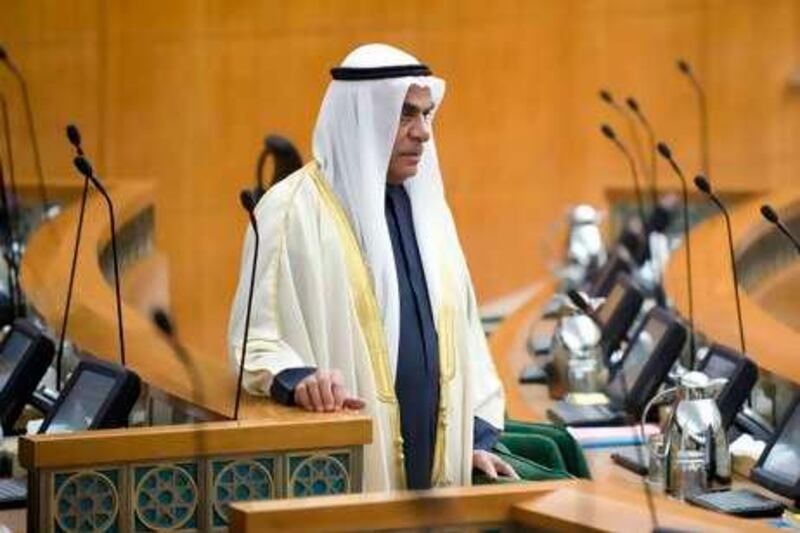KUWAIT CITY // Political rivalry and incompetent ministers are to blame for Kuwait's political crisis, say politicians and analysts, who also fear the country's democracy may be under threat. The National Assembly's last regular session was adjourned last week when the government did not show up. The cabinet had resigned in November after three Islamist MPs demanded to question Sheikh Nasser Al Sabah, the prime minister.
The cabinet's resignation is the latest in a disruptive pattern of recent years. Sheikh Nasser, who was reappointed prime minister by Emir Sheikh Sabah Al Sabah last Wednesday, will now form the fifth cabinet since he was first appointed in Feb 2006. But many politicians do not accept the view that the political system itself is a major cause of the problems. Instead, they believe that with the right people in place, things will run more smoothly.
One such MP is Naser al Sane, who is a member of the Islamic Constitutional Movement - an offshoot of the Muslim Brotherhood. He wears a short beard, a trademark of the party, and speaks confidently in Arabic or English. Mr al Sane said crises were not inherent, but incompetent ministers and poor decision-making were the root of the problem. "It's the practice of the system that is wrong," he said.
Nizar Hamzeh, a professor of political science at the American University of Kuwait, said deadlock "seems to be the outcome of all politics in Kuwait. The system is on the verge of failing should this continue." The result might not be "revolution or wars", but malignant politics will strangle the economy, he said.
Mr Hamzeh blames problems on the rivalry between the government and the parliament, which is antagonistic and poorly defined. The prime minister looks after royal interests when he appoints the other 15 members of the cabinet, while tribal, religious and sectarian groups hold sway in the election of the 50-member parliament. And conflict within the assembly is growing. "In the last three years, you're having more of a rise of opposition forces in the parliament," Mr Hamzeh said, such as Islamist and left-wing groups. Parties are technically illegal in Kuwait, but de facto parties still exist. Ali al Rashed, an independent MP, echoes this view. "The system can work very well, it's a problem with the people," he said, "if good people are involved they can make it better for the future." Both ministers said a feud within the royal family is causing much of the instability. The rumours, reported in the local press, suggest that royal family members who used to be ministers are using MPs to create dissent in the hope that they will return in a reshuffle. "The prime minister is opposed by another strong royal family group from within the family, and this group is competing with the prime minister for power," Mr al Sane said. Mr al Rashed said: "We live in very dangerous moments in the political life in Kuwait. We could lose democracy." He said reliable sources have told him that the emir might step in and close parliament down. This has happened before. The assembly was suspended for five years in 1976 and six years in 1986. The latest episode stems from demands of MPs to question Sheikh Al Sabah after authorities permitted the visit of an Iranian cleric. The cleric had been fined and barred from entering Kuwait this year for allegedly insulting companions of the Prophet Mohammed. Kuwait's constitution permits MPs to question anyone in the government, and this happens regularly. But the prime minister is a potential heir to the throne. The royal family's supporters believe that interrogation of the future emir would be an unacceptable slight on his honour. However, Mr al Rashed disagrees. "There are two kinds of opinion. Some say: even if he is the crown prince, we can grill him. Others say you can't. But in my opinion, as a lawyer, I think you can do it," he said. For all his concerns, Mr al Rashed is still positive about the future. "There will be problems, but not collapse," he said. "The people in Kuwait still want the royal family; they believe in them." jcalderwood@thenational.ae





